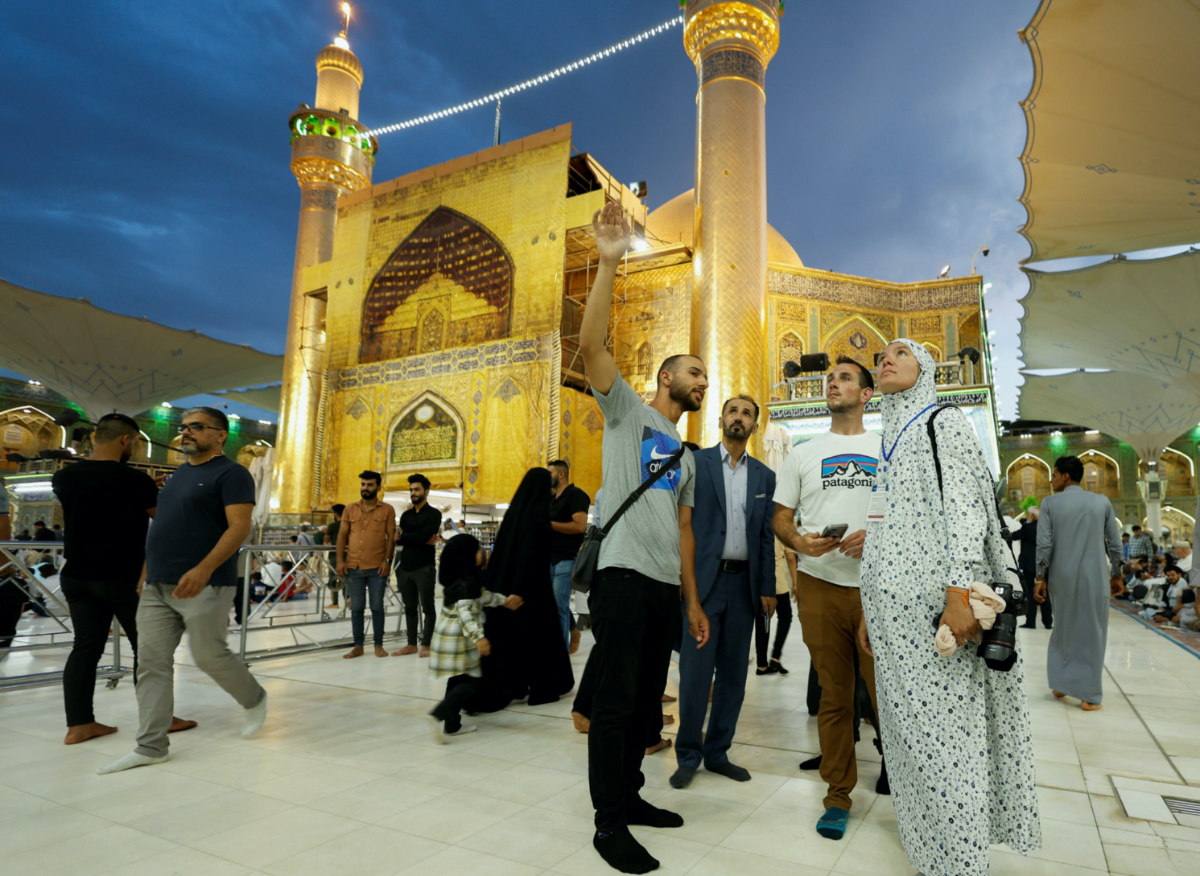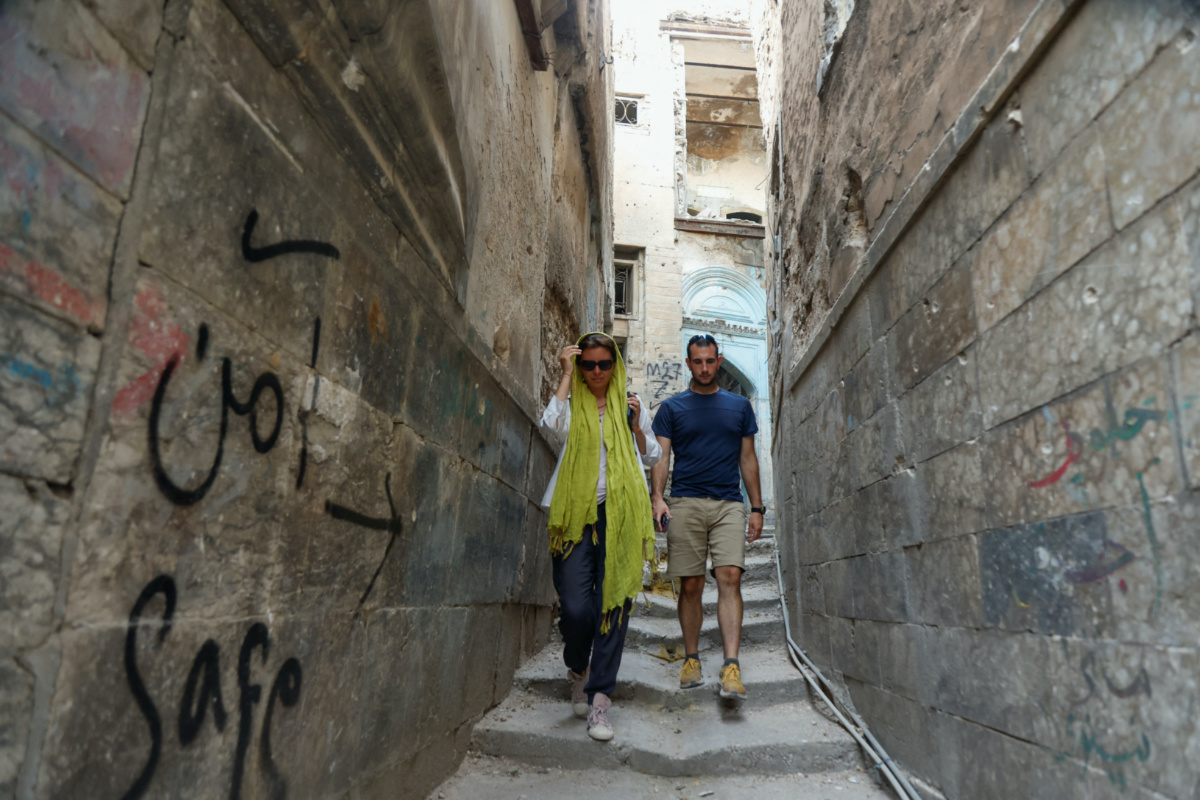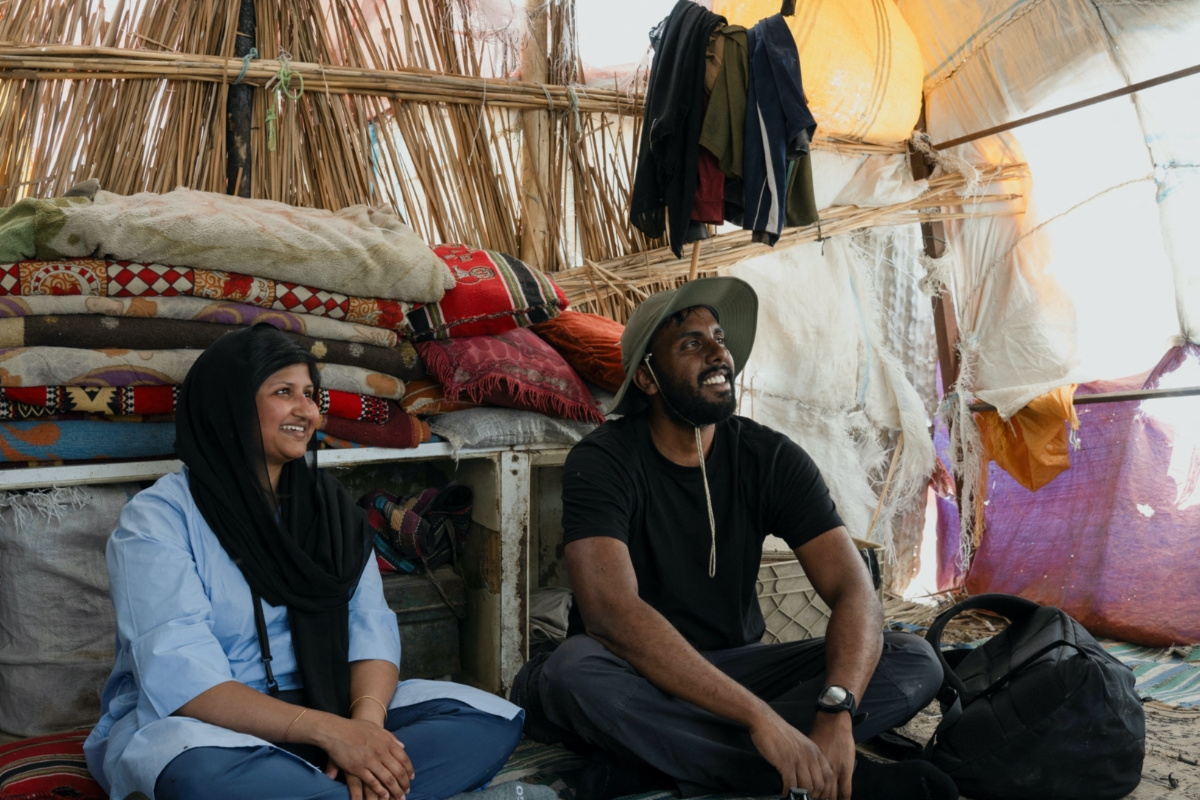Baghdad, Iraq
Reuters
When Jacob Nemec’s family heard he was planning to go on holiday in Iraq, they pleaded with the 28-year-old American to reconsider.
“I got a text from my grandma for the first time in five years saying – being your grandmother and to respect me – I would appreciate if you don’t go. I got crying phone calls from my mum,” said Nemec, a warehouse supervisor from Reno, Nevada.
He decided to go anyway, but understood his family’s concerns.

Anna Nikolaevna, 38, a Russian national, and Jacob Nemec, 29, an American national, look on during a tour at Imam Ali shrine, in the holy city of Najaf, Iraq, on 5th June, 2023. PICTURE: Reuters/Alaa Al-Marjani
Iraq has seen almost non-stop turmoil for decades, from an eight-year war with Iran in the 80s, to the first Gulf war in the 90s and heavy sanctions, the 2003 US invasion, years of bloody sectarian warfare and then conflict with Islamic State militants.
The situation, however, has gradually improved since Islamic State’s territorial defeat in 2017, with blast walls coming down and cranes going up in Baghdad and other cities as they turn to construction and find a new sense of normalcy.
Iraq hosted its first Gulf Cup in more than 40 years earlier this year, with thousands of Arab visitors in attendance – an event that helped put the country back on the map.
Now, a small but growing number of tourists are heading to Iraq to see attractions spanning from vast desert and marshland ecosystems to ruins of the worlds earliest cities and empires.
Many have come from neighbouring Arab Gulf countries, but defying warnings advising against travel, an increasing number of adventurous tourists are also trickling in from Europe and the United States.
Nemec, along with a Russian and a British tourist, visited the maze-like ruins of the ancient city of Babylon, the Shi’ite holy city of Najaf with its tight alleys and mud-brick houses, and the old city of Mosul in the north.
“I was a little hesitant coming as a American, like ‘Oh, my God, my government did really bad things here. Is everyone going to hate me for that?'” Nemec said.
“That hasn’t been the case at all…Governments can be bad, but people wherever you go are good.”
The uptick in tourism coincides with a push by Iraq’s government to show that the country is safe and open to foreign businesses and visitors as it looks to diversify its oil-dependent economy.
Tourism Minister Ahmed Fakak Al-Badrani said work was underway to build new hotels to keep up with growing demand and to refurbish tourist sites and heritage buildings.
He said the country’s image in the West as an arena of conflict would gradually change as more people visited.
Tourists “are messengers who tell these states that Iraq has returned to being a safe country and is not a red line as some say. Maybe the issue needs some time, but not too long,” he told Reuters.
Foreign governments are not convinced.

Anna Nikolaevna, 38, a Russian national, and Jacob Nemec, 29, an American national, walk during a tour of the old city of Mosul, Iraq on 7th June, 2023. PICTURE: Reuters/Khalid Al-Mousily
“Do not travel”
The US and European countries still warn against any travel to Iraq due to security concerns. The US State Department website says: “Do not travel to Iraq due to terrorism, kidnapping, armed conflict, civil unrest”.
It urges people to write a will and make funeral arrangements with their families should they chose to go.
Westerners became a main target of kidnappings and killings following the US invasion, including by extremist Sunni Muslim groups such as al-Qaeda and Islamic State, and hardline Shi’ite militias close to Iran, all of whom viewed the United States as an occupier.
In November of last year, a US citizen was killed in central Baghdad – a rare attack that nonetheless sent jitters through the foreign community in the city.
Five Western diplomats said that there would be no change to US or European travel advisories any time soon due to the continued possibility of unpredictable violence, such as armed clashes in Baghdad last year that killed dozens of Iraqis.
That has not stopped people coming, though just how many are showing up is unclear.
A side forgotten
The tourism minister did not provide figures of tourist arrivals.
Major-General Abdel-Karim Sudani, a security adviser to the prime minister, told Reuters just over 2.5 million foreigners had visited Iraq in the six-month period between 15th November 2022, and 15th May of this year, including 312,000 Arab visitors.
In any case, the tourism sector remains heavily underdeveloped.
Few of the ancient ruins that dot the country have signs describing their significance, nor accredited tour guides.
Baghdad International Airport does not have its own website, with the top search item instead directing browsers to a page that warns: “We do not recommend to visit the country (it is one of the most dangerous places on Earth).”
Many Iraqis are trying to make up for those shortcomings and show another side of the country.

Lorin and Galton Lenie, French tourists of Sri Lankan descent, who are on their first visit to Iraq, sit in a local home during a tour of the marshes, within Chibayish in Nassiriya, Iraq, on 14th June, 2023. PICTURE: Reuters/Forqan Salam
Ali Hilal, a travel blogger, is one of them.
He got stuck in Iraq during the COVID-19 pandemic while visiting from Canada where he lived, and decided to travel around the country, filming magnificent ancient palaces and lush green mountains in videos posted online and shared widely.
“Of course we have innumerable political and social and environmental problems,” Hilal said.
“But there is a side we might have forgotten, and that’s the side I am trying to see and have people see with me.”
– With KHALID AL-MOUSILY in Mosul






